Deep Green Academics, Ideas have Consequences!Bevin ChuJuly 28, 2006
 Deep Green Academics reiterate their Demand that "President" Chen Shui-bian step downThe following article from the Taipei Times contains a sobering lesson for the Deep Green academics mentioned in my previous weblog entry, Deep Green Academics want a Fuhrer with a Cleaner Image.That lesson is: "Ideas have consequences."Specifically, these Deep Green academics' own immoral ideas have had disastrous long term consequences, not only for society at large, but even for the Deep Green academics' own narrow agenda.The problem is not that these Deep Green academics' recent criticisms of Chen Shui-bian, the DPP, and their fellow Taiwan independence True Believers are wrong.The Deep Green academics' recent criticisms of Chen Shui-bian, the DPP, and their fellow Taiwan independence True Believers are unquestionably right.The problem is that these Deep Green academics were among those who consciously dealt Chen Shui-bian, the DPP, and the Taiwan independence movement their trump card -- morally repugnant but politically effective "Taiwanese, not Chinese" identity politics.The Deep Green academics' "Taiwanese, not Chinese" identity politics are the Teflon talisman Chen Shui-bian, the DPP, and other members of the Taiwan independence movement have wielded against charges of malfeasance from the Pan Blue camp for nearly two decades.For the past 18 years, any and all charges of ruling Pan Green regime wrongdoing have been cavalierly dismissed, at best as "Pan Blue partisanship," and at worst as "mainlander pigs' refusing to allow downtrodden native Taiwanese their day in the sun."This Taiwanese version of the race card amounts to a no limit Platinum Card, one that Chen Shui-bian, the DPP, and the Taiwan independence have swiped to the limit.[Note: Lee Teng-hui was not a Pan Blue politician. Lee Teng-hui was a Pan Green politician in Pan Blue sheep's clothing. Pan Green rule began with Lee Teng-hui's first term as ROC president. The KMT under Lee Teng-hui is sometimes referred to facetiously as the "tai wan guo min dang," or "Taiwan KMT," rather than the "zhong guo guo min dang" or "Chinese KMT". Former KMT Chairman Lien Chan, to his everlasting credit, restored the KMT to its rightful role as China's KMT.]The Deep Green academics' own morally reprehensible "Taiwanese, not Chinese" identity politics are what have allowed Chen Shui-bian, the DPP, and the Taiwan independence movement to ignore the Deep Green academics' belated appeals to the better angels of their nature.Thanks to these Deep Green academics, Chen Shui-bian, the DPP, and the Taiwan independence movement long ago turned a deaf ear to the better angels of their nature.Not to put too fine a point on it, the Deep Green academics' ideological chickens have come home to roost.
Deep Green Academics reiterate their Demand that "President" Chen Shui-bian step downThe following article from the Taipei Times contains a sobering lesson for the Deep Green academics mentioned in my previous weblog entry, Deep Green Academics want a Fuhrer with a Cleaner Image.That lesson is: "Ideas have consequences."Specifically, these Deep Green academics' own immoral ideas have had disastrous long term consequences, not only for society at large, but even for the Deep Green academics' own narrow agenda.The problem is not that these Deep Green academics' recent criticisms of Chen Shui-bian, the DPP, and their fellow Taiwan independence True Believers are wrong.The Deep Green academics' recent criticisms of Chen Shui-bian, the DPP, and their fellow Taiwan independence True Believers are unquestionably right.The problem is that these Deep Green academics were among those who consciously dealt Chen Shui-bian, the DPP, and the Taiwan independence movement their trump card -- morally repugnant but politically effective "Taiwanese, not Chinese" identity politics.The Deep Green academics' "Taiwanese, not Chinese" identity politics are the Teflon talisman Chen Shui-bian, the DPP, and other members of the Taiwan independence movement have wielded against charges of malfeasance from the Pan Blue camp for nearly two decades.For the past 18 years, any and all charges of ruling Pan Green regime wrongdoing have been cavalierly dismissed, at best as "Pan Blue partisanship," and at worst as "mainlander pigs' refusing to allow downtrodden native Taiwanese their day in the sun."This Taiwanese version of the race card amounts to a no limit Platinum Card, one that Chen Shui-bian, the DPP, and the Taiwan independence have swiped to the limit.[Note: Lee Teng-hui was not a Pan Blue politician. Lee Teng-hui was a Pan Green politician in Pan Blue sheep's clothing. Pan Green rule began with Lee Teng-hui's first term as ROC president. The KMT under Lee Teng-hui is sometimes referred to facetiously as the "tai wan guo min dang," or "Taiwan KMT," rather than the "zhong guo guo min dang" or "Chinese KMT". Former KMT Chairman Lien Chan, to his everlasting credit, restored the KMT to its rightful role as China's KMT.]The Deep Green academics' own morally reprehensible "Taiwanese, not Chinese" identity politics are what have allowed Chen Shui-bian, the DPP, and the Taiwan independence movement to ignore the Deep Green academics' belated appeals to the better angels of their nature.Thanks to these Deep Green academics, Chen Shui-bian, the DPP, and the Taiwan independence movement long ago turned a deaf ear to the better angels of their nature.Not to put too fine a point on it, the Deep Green academics' ideological chickens have come home to roost.
The Deep Green academics' Viktor Frankenstein monster, Hoklo Chauvinist fascism, is running amok in the countryside, ignoring the moral appeals of its creator.
Published on TaipeiTimesPan-green academics call again for Chen's resignationThursday, July 27, 2006A group of pan-green academics who created a stir earlier this month by demanding President Chen Shui-bian's (陳水扁) resignation launched a second salvo yesterday, saying in a statement that 20,000 people supported their petition and that Chen's response to their appeal had been disappointing.The academics said that they regretted that Chen had not resigned in the wake of their first public statement on July 15, and that Chen had since then failed to offer any solution to the fundamental problem with his continued leadership, which was the collapse of public trust.In their statement, the pan-green academics also criticized the leaders of the Democratic Progressive Party (DPP) for lacking the stamina and imagination to work out a new vision for the nation's future."Only by developing an energetic and independent civil society can we improve the country's democracy," the group's statement said. "Only picky people can promote a better-quality political party."The press conference was held at the Machangting (馬場町), a former execution ground for political prisoners adjacent to Youth Park, to highlight the fact that the DPP has not sufficiently dealt with the issue of transitional justice, according to the chief convener of the group Fan Yun (范雲), associate professor at National Taiwan University.Political scientist Wu Rwei-ren (吳叡人) said that building civil society and promoting recognition for Taiwan was the only way out for the country. Wu said the DPP should prepare itself to be the opposition party for a long time, because it had forfeited the opportunity to write a new constitution for the country.Attorney Lo Bing-cheng (羅秉成), who served as Chen's defense attorney in the lawsuit over the vote recount after the 2004 presidential election, said yesterday that Chen had destroyed the public's trust in the rule of law because of his convoluted and ambiguous excuses for the SOGO voucher scandal and his son-in-law's alleged involvement in corruption."Now that President Chen has stubbornly defied the recall drive, why doesn't he just leave office and fight to prove his and his family's innocence and protect his family's reputation? `So, Go,' please!" Lo said.
Deep Green Academics want a Fuhrer with a Cleaner ImageBevin ChuJuly 17, 2006
 數名親綠學者、社團人士,包括台大社會系助理教授范雲(右起)、中研院台灣史研究所助研究員吳叡人、前美麗島雜誌總編輯張富忠、中研院社會所研究員吳乃德、清大社會所副教授吳介民與婦女新知董事長黃長玲等人,昨天舉行記者會,要求陳水扁總統主動請辭下台。Caption: Several pro green scholars and NGO leaders, including National Taiwan University Assistant Professor Fan Yun (far right), Academia Sinica Taiwan History Research Institute Assistant Researcher Wu Rui-ren, former Formosa Magazine Editor-in-Chief Chang Fu-chung, Academia Sinica Social Science researcher Wu Nai-teh, Qinghua University Social Science Associate Professor Wu Chieh-min and Women's Studies Chairman Huang Chang-ling, yesterday held a press conference, asking President Chen Shui-bian to resign on his own initiative.The banner on the wall reads: "yi min zhu feng fu tai wan ren tong," i.e., "using democracy to enrich identification with Taiwan"Source: UDN News
數名親綠學者、社團人士,包括台大社會系助理教授范雲(右起)、中研院台灣史研究所助研究員吳叡人、前美麗島雜誌總編輯張富忠、中研院社會所研究員吳乃德、清大社會所副教授吳介民與婦女新知董事長黃長玲等人,昨天舉行記者會,要求陳水扁總統主動請辭下台。Caption: Several pro green scholars and NGO leaders, including National Taiwan University Assistant Professor Fan Yun (far right), Academia Sinica Taiwan History Research Institute Assistant Researcher Wu Rui-ren, former Formosa Magazine Editor-in-Chief Chang Fu-chung, Academia Sinica Social Science researcher Wu Nai-teh, Qinghua University Social Science Associate Professor Wu Chieh-min and Women's Studies Chairman Huang Chang-ling, yesterday held a press conference, asking President Chen Shui-bian to resign on his own initiative.The banner on the wall reads: "yi min zhu feng fu tai wan ren tong," i.e., "using democracy to enrich identification with Taiwan"Source: UDN News
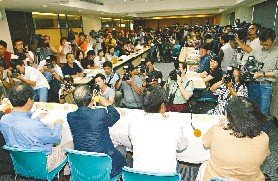 Deep Green Academics turning on Chen is obviously considered news
Deep Green Academics turning on Chen is obviously considered news
So Deep Green ("mo lu" i.e., "ink green") academics have finally turned on Chen Shui-bian. It's about time. On principle alone, these Deep Green academics should have turned on Chen long ago, certainly long before Lee Teng-hui and the TSU.
Why didn't they? Could it be that even for Deep Green academics, who habitually adopt a holier than thou attitude toward their Pan Blue colleagues, Pan Green Political Correctness nevertheless trumps moral principles?On the one hand, "better late than never."On the other hand, these Deep Green academics are "a day late and a dollar short." These Deep Green academics are a day late in the sense that they have been far too tardy in speaking up against flagrant Pan Green corruption. Had they been authentic men and women of conscience, they would have spoken up in March 2004, when Chen perpetrated his patently phony "Wag the Dog" shooting hoax on ROC voters. But tardiness is hardly their most serious shortcoming. Their most serious shortcoming is that in addition to being a day late, these Deep Green academics have still come up a dollar short.As the banner on the wall behind them unwittingly reveals, these Deep Green academics still haven't seen the light. The banner these ostensibly high-minded Deep Green academics tacked on the wall reads "yi min zhu feng fu tai wan ren tong," i.e., "using democracy to enrich identification with Taiwan." Did you get that? These Deep Green academics were not "using identification with Taiwan to enrich democracy," but "using democracy to enrich identification with Taiwan."By their own admission, "democracy" was merely a useful means to their real end, their real end being "identification with Taiwan," and by implication, "disidentification with China." In short, here we are again, right back at the Taiwan independence movement's most primitive, most atavistic core value -- its artificially concocted, petty tribalist, "Taiwanese, not Chinese" identity politics.These Deep Green academics' minds are so addled by "ben tu" or "nativist" orthodoxy, they no longer realize the moral reprehensibility of their political appeal.Think about it for a moment. What exactly are they demanding?They're demanding the establishment of a political system explicitly rooted in tribal identity, in which a "ben tu" or "native" ethnic identity is the supreme value.They're demanding furthermore, that their political system, rooted in "nativist" ethnic bigotry, be "enriched" with the trappings of "democracy."Their disaffection with Chen Shui-bian as a nativist fuhrer does not reflect an enlightened realization that their nativist political agenda is morally reprehensible to begin with.Their disaffection with Chen Shui-bian merely reflects their belated realization that a nativist fuhrer whose rampant corruption can no longer be swept under the rug is a public relations liability rather than asset.In other words, these Deep Green academics have no objection to a bigoted nativist demagogue demanding "Taiwanese nation building," based on an ersatz "Taiwanese national identity."On the contrary, they closely identify with and enthusiastically approve of Chen's nativist political agenda. Chen's agenda is their agenda.After all, these same Deep Green academics didn't complain about Chen Shui-bian during the last six years, while he was making exactly the same nativist political appeals that he's making this year.These Deep Green academics merely object to a nativist demagogue whose badly tarnished public image has become an obvious detriment to their nativist political agenda.Am I exaggerating? Am I distorting their position?Hardly.As the militantly nativist Taipei Times put it: The academics said that the president failed to clarify the corruption scandals and lost his ability to solve the country's crisis as a leader of pro-localization forces. [emphasis added] A few of my Pan Blue comrades, including Pan Blue pundits and Pan Blue political leaders, have expressed approval of the Deep Green academics' stand against Chen and the DPP.I beg to differ.The moral defect at the heart of the Taiwan independence movement is its atavistic appeal to primitive bigotry. What these Deep Green academics are demanding is not that this nativist bigotry be repudiated as fundamentally immoral.What these Deep Green academics are demanding is that this nativist bigotry be given a public relations makeover.
What these Deep Green academics want is a fuhrer with a cleaner image.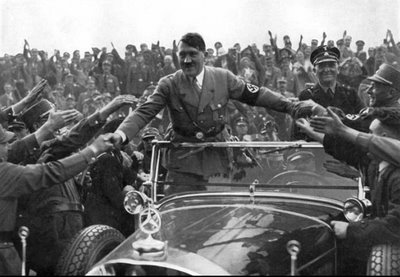 Adolf Hitler, Fuhrer of the Aryan People
Adolf Hitler, Fuhrer of the Aryan People
 Chen Shui-bian, Fuhrer of the Hoklo People
Chen Shui-bian, Fuhrer of the Hoklo People
The late Barry Goldwater once said that "extremism in the defense of liberty is no vice."One might well add that "integrity in the service of bigotry is no virtue."Published on TaipeiTimes Pan-green academics turn on Chen A HOUSE DIVIDED: While the academics called for Chen to seriously consider stepping down, other groups were planning a similar conference to counter the motion Sunday, July 16, 2006 After surviving a recall motion initiated by the pan-blue camp last month, President Chen Shui-bian (陳水扁) is facing his toughest political challenge yet as his own camp appears divided on whether he should step down amid allegations of corruption involving his family and close aides.A group of pan-green academics yesterday held a press conference urging Chen to take political and moral responsibility and seriously consider stepping down, while another pro-green group was mulling whether to hold a press conference tomorrow to counter the former's motion.A statement entitled "Democracy and the Moral Crisis of Taiwanese Identity -- Our Appeal to the President, the Ruling Party and Taiwanese Citizens," was released yesterday at the press conference by a number of pan-green academics.Group member Fan Yun (范雲), quoting from the statement, said: "We expect President Chen to realize how heavy his responsibility is as a president ... When he loses credibility and the trust of the people, we urge him to seriously consider resigning from his post."Together with a signature drive launched earlier this week, which has attracted more than 4,000 signatures, the group pressed for the president to resign voluntarily in order to "set a good example and make a contribution to Taiwan's democracy."Wu Nai-teh (吳乃德), one of the academics and the younger brother of former Taiwan Stock Exchange chairman Wu Nai-jen (吳乃仁), denied the move was an "anti-Chen Shui-bian movement."He said that seeking a more mature democracy and Taiwanese identity were the ultimate goal."Taking down the president is not the objective. What we want is to raise the quality of Taiwan's democracy," he saidWu added that Chen's resignation on his own initiative would help raise the quality of democratic politics.Chang Fu-chung (張富忠), editor in chief of Formosa magazine and a pro-democracy movement veteran, lashed out at the Democratic Progressive Party (DPP) for "sinking into depravity" over the past six years as the ruling party.Chang also said that the DPP had drifted away from its spirit and ideals established during the dangwai ("outside the party," 黨外) democratic movement period.Chang questioned the DPP's silence on recent corruption cases involving the president's family members and close aides in an attempt to protect Chen."Where is the party's self-critical spirit now?" he said.The academics said that the president failed to clarify the corruption scandals and lost his ability to solve the country's crisis as a leader of pro-localization forces.If the president shrugged off their appeal and refused to step down, Wu Rwei-ren (吳叡人), a researcher at Academia Sinica, said the group would continue the signature drive, while Lee Ting-tsan (李丁讚), a sociology professor at National Tsinghua University, suggested that the DPP should revoke Chen's party membership.While the group's online signature drive has attracted thousands of signatures over the past two days, the Web site's lack of an identity verification system has allowed some mischief makers into the site. Names like Chen Shui-bian, Vice President Annette Lu (呂秀蓮), and even US President George W. Bush were spotted on the petition before being removed.Meanwhile, Chinese Nationalist Party (KMT) Chairman Ma Ying-jeou (馬英九) yesterday said that the group's view is similar to that of the pan-blue camp."But the same remarks made by the pan-blue camp were twisted as ethnic or political clashes ... Now that the pro-green academics have come out and made their statement, it's easier to see the problem," Ma said after presiding over a municipal event.Other pan-green groups, however, disagreed with the academics' view. These include the Northern Society and the Southern Society, which are planning to hold a news conference tomorrow to present their opposing views.Meanwhile, Chen will invite key players within his administration and party, legislators as well as city and county chiefs tomorrow to discuss the latest political development.Cho Jung-tai (卓榮泰), deputy secretary-general of the Presidential Office, said yesterday that the president attaches great importance to the academics' views "which are the expression of ideals," and that he will seek to "communicate more with them."But with regards to allegations that the president was lacking in "self-reflection," Cho said, "this is far from true."DPP legislators yesterday expressed hope that the president will hear the "true voice of the grassroots" in tomorrow's meeting.DPP caucus whip Chen Chin-jun (陳景峻) said the president should try to fully understand the will of the people and the public's perception about his son-in-law, Chao Chien-ming (趙建銘). Chao was indicted on insider trading charges on July 10. He was released on NT$10 million bail that evening after being detained for 47 days.One DPP legislator who requested anonymity said the president had called for similar meetings before whenever he ran into difficulties, but the meetings ended with no results.DPP Legislator William Lai (賴清德) said that by listening to the views of the people, President Chen could help the first family and the DPP overcome current difficulties.Lai hoped the president would listen closely to all views, instead of "lecturing" as in the past; otherwise, "no one will take part in such meetings anymore."DPP Legislator Wang Hsin-nan (王幸男) also said that "it is never too late to reform and to reflect," and the president should "listen to the voice of those who used to love and pamper him."
Japanese Diet, Grill Your Own! Bevin ChuJuly 14, 2006
Political scientist Michael Parenti once noted that "The first atrocity, the first war crime committed in any war of aggression by the aggressors is against the truth."
Parenti noted that the US major media, and much of the minor media, are accomplices in this process. They help reverse the roles of victims and victimizers, warmongers and peacekeepers, reactionaries and reformers. The following Taipei Times news story is newsworthy for one reason. It confirms the truth of Michael Parenti's observation.
The Taipei Times is of course not a US media organization. It is something much worse. It is a willing tool of US and Japanese neocolonialism and neoimperialism against a peacefully developing post Cold War China.
The Taipei Times' willingness, nay eagerness, to fill such a contemptible role, reflects the Taiwan independence movement's inverted moral premises, in which the roles of victims and victimers, warmongers and peacekeepers, reactionaries and reformers are neatly reversed.
According to the Taiwan independence movement's inverted moral calculus, their own nation, China, deserves to be looked upon with undisguised contempt, for being so impotent as to allow Japan to annex Taiwan in 1895. Japan, the flagrant aggressor, on the other hand, deserves to be looked upon with undisguised admiration, for being so powerful that it could take Taiwan from China at will.
According to the Taiwan independence movement's inverted moral calculus, Chinese, Korean, and Philippine mothers, sisters, and daughters kidnapped by the Japanese Imperial Army and forced into sexual slavery during WWII have unfairly defamed and embarrassed Taiwan's magnanimous colonial benefactor.
According to the Taiwan independence movement's inverted moral calculus, China's painful struggle to prevent the reannexation and recolonization of territory universally acknowledged to be her own, amounts to ominous Chinese expansionism, fortunately held in check by the US and Japan, "the world's champions of freedom and democracy."
Given the Taiwan independence movement's inverted moral calculus, it is not the least bit surprising that the Taipei Times would report on Ma Ying-jeou's visit to Japan the way it has.
Deep Blue pundits such as myself have faulted Ma Ying-jeou on a number of domestic issues, including the way he has dealt with the 2004 election and reunification with the mainland. But when it comes to Japan, Ma Ying-jeou has consistently assumed the role of the little boy who blurted out, "The emperor has no clothes!" The emperor In this case being Japanese emperor and war criminal Hirohito.
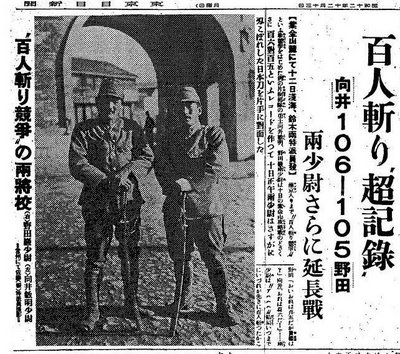
The Rape of Nanking was not a "Chinese fabrication." Two Japanese officers, Toshiaki Mukai and Tsuyoshi Noda compete to see who will kill one hundred Chinese civilians first, using samurai swords. The Tokyo Daily News headline reads "Astonishing Record in the 100 Man Execution Contest -- Mukai 106 -- 105 Noda -- Two 2nd Lieutenants Go Into Extra Innings."
 During the six week long orgy of destruction known as the Rape of Nanking, the Japanese Imperial Army slaughtered 300,000 unarmed Chinese civilian noncombatants. An estimated 12,000 were mass executed in a single excavation known as the "Ten Thousand Corpse Ditch," a trench measuring 300m long by 5m wide.
During the six week long orgy of destruction known as the Rape of Nanking, the Japanese Imperial Army slaughtered 300,000 unarmed Chinese civilian noncombatants. An estimated 12,000 were mass executed in a single excavation known as the "Ten Thousand Corpse Ditch," a trench measuring 300m long by 5m wide.
If the Taipei Times were a real newspaper, rather than an apologist for US and Japanese neocolonialism and neoimperialism, it would restore, not invert the roles of victims and victimizers, warmongers and peacekeepers, reactionaries and reformers.
If the Taipei Times were a real newspaper, it would have published an editorial reading:
So Japanese Diet members want to grill Ma Ying-jeou?
What monumental presumption. Ma Ying-jeou is the one who ought to be grilling warmongering Japanese Diet members.
So a group of pro-Taiwan independence Japanese parliamentarians demand to know "if the KMT chairman would make Taiwan [sic] anti-Japanese if he becomes the next president?"
What colossal effrontery. Ma Ying-jeou is the one who ought to be demanding to know when, not if, these pro-Taiwan independence Japanese demagogues are going to stop making Japan anti-Chinese?
Published on TaipeiTimesMa grilled by Japanese Diet membersHARD QUESTIONS: A group of pro-Taiwan parliamentarians wanted to know if the KMT chairman would make Taiwan anti-Japanese if he becomes the next presidentThursday, July 13, 2006Chinese Nationalist Party (KMT) Chairman Ma Ying-jeou was confronted with a series of hard questions in a meeting with scores of Japanese Diet members yesterday.Facing a volley of questions from Diet members, on issues ranging from concern over Ma's reportedly anti-Japanese views, to his stance on the dispute over the Diaoyutais and Taiwan's long-stalled arms procurement plan, Ma appeared overwhelmed.Ma's current trip to Japan is his first visit to the country in his capacity as KMT chairman. He had said that he would use the trip to correct the "misunderstandings" that some Japanese politicians have about him.Saying that Taiwan is a friendly country which understands Japan well, Diet member Yasuhiro Oe, a member of the Democratic Party of Japan and one the nearly 70 parliamentarians from a pro-Taiwan Japanese parliamentary group present at the meeting yesterday, expressed concern over Ma's stands on the Diaoyutais and his rhetoric about the Yasukuni shrine.Ma took part in a campaign in the early 1970s to defend the disputed Diaoyutais, known as the Senkaku islands in Japanese, and surrounding waters.Japan declared the islands to be part of its territory in 1895. They were temporarily put under US control after World War II, before being returned to Japanese rule in 1972, together with the Ryukyu island chain.On Tuesday, Ma criticized Japanese Prime Minister Junichiro Koizumi's visit to the shrine, urging him to take a broader look at history.Oe added that he is worried that Taiwan could become an anti-Japanese country, should the KMT gain power under Ma's leadership in the next presidential election.Former Japan Defense Agency head Shigeru Ishiba asked "what kind of logic is it" that, despite the intensifying military competition in East Asia, arms procurements are still being blocked in the legislature by the KMT.In response to both Oe and Ishiba's comments, Ma said that "although both parties have different views, [these different views] will not affect Taiwan-Japan relations."Ma stressed that the internal disagreements on these issues would not affect relations between Taiwan and Japan, and that it was impossible for two countries to have the same stance on all issues.Taiwan and Japan should, via contact and negotiations, broaden the views that they both share and shorten the gaps on issues on which they are at odds, Ma said, adding that this is the most effective way to ensure mutual friendship.
As of today The China Desk will cease posting reader comments.Otherwise The China Desk will remain the same as it has for the past decade.As long time readers of The China Desk know, the reader comments feature provided by blogger.com is something new for The China Desk. Therefore discontinuing the reader comments feature is actually a return to the norm for The China Desk.The reason for this return is time. Responding to fatuous (vacuously, smugly, and unconsciously foolish) Taiwan independence trollers, on a one on one basis, is simply not worth the author's limited time.Time is life, and life is much too short and far too precious to squander in such a manner.
The time that would have been wasted responding to Taiwan independence trollers will instead be devoted to future articles on Sino-US and cross-Straits relations, in the hope that most if not all readers will find them worthwhile.
The author of The China Desk trusts that his anti-interventionist, anti-colonialist, anti-imperialist comrades share his feelings about frivolous trolling by Taiwan independence Quislings and Taiwan independence fellow travelers, and will approve of his latest measure.
Sincerely, Bevin Chu
Chen Shui-bian, Taiwan's Caligula
Bevin Chu
July 08, 2006
History repeats itself, first as tragedy, second as farce.
-- Karl Marx (1818-1883)
History as Tragedy
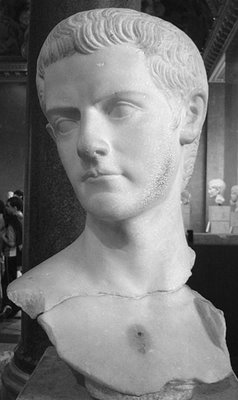 Gaius Julius Caesar Augustus Germanicus, aka Caligula The Praetorian Guard was formed by the emperor Augustus to help prevent assassins from reaching the emperor and murdering him as Brutus and his companions had murdered Julius Caesar. It was called by that name in imitation of the Praetoria Cohors, or select troop, which attended the person of the praetor or general of the Roman army.
Gaius Julius Caesar Augustus Germanicus, aka Caligula The Praetorian Guard was formed by the emperor Augustus to help prevent assassins from reaching the emperor and murdering him as Brutus and his companions had murdered Julius Caesar. It was called by that name in imitation of the Praetoria Cohors, or select troop, which attended the person of the praetor or general of the Roman army.
Caligula paid the Praetorian Guard one thousand sesterces each, probably for the purpose of maintaining their loyalty.
Instead of protecting the emperor from assassination [however], many times the Praetorian Guard were the very ones to murder an emperor.
Caligula became so dangerous and unstable he was murdered by a detachment of the Praetorian Guard. Caligula was assassinated because he had made a mockery of the military and alienated the leaders of the Guard. [emphasis added]
The Praetorian Guard has become a byword for any military force which is used to prop up a ruthless regime.
Source: Global Security, Praetorian Guard
http://www.globalsecurity.org/military/intro/praetorian.htm
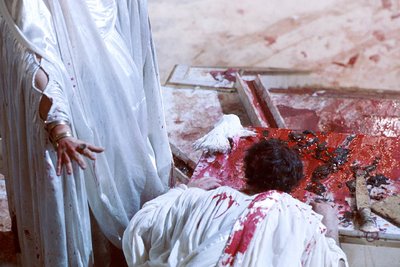 Caligula (12 AD - 41 AD) History as Farce
Caligula (12 AD - 41 AD) History as Farce
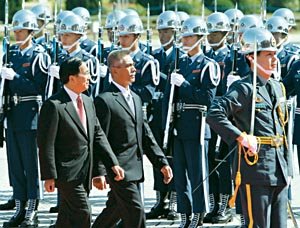 "President" Chen Shui-bian, reviewing his Honor Guard The Ministry of National Defense (MND) yesterday confirmed that Chu Chao-kang, an army honor guard who posted a message in an Internet chatroom suggesting that he wanted to do harm to the president, was detained by military prosecutors.The MND said that military prosecutors decided to detain Chu on July 4 because his behavior violated Article 14-1 of the Military Criminal Code -- a violation punishable by up to seven years in prison.Chu wrote in his message that when President Chen Shui-bian welcomed Nauru President Ludwig Scotty with an honor guard on March 7, "I almost could not resist the urge to poke my M-1 rifle into the president's head." [emphasis added] The military also relieved Chu of his honor guard duties immediately after being made aware of the message he posted on the Internet.
"President" Chen Shui-bian, reviewing his Honor Guard The Ministry of National Defense (MND) yesterday confirmed that Chu Chao-kang, an army honor guard who posted a message in an Internet chatroom suggesting that he wanted to do harm to the president, was detained by military prosecutors.The MND said that military prosecutors decided to detain Chu on July 4 because his behavior violated Article 14-1 of the Military Criminal Code -- a violation punishable by up to seven years in prison.Chu wrote in his message that when President Chen Shui-bian welcomed Nauru President Ludwig Scotty with an honor guard on March 7, "I almost could not resist the urge to poke my M-1 rifle into the president's head." [emphasis added] The military also relieved Chu of his honor guard duties immediately after being made aware of the message he posted on the Internet.
Source: TaipeiTimesTaiwan Quick Take: MND detained honor guardSaturday, July 08, 2006
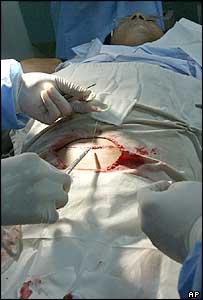 Chen Shui-bian's patently phony Wag the Dog "assassination attempt" of 2004. Will next time be for real?
Chen Shui-bian's patently phony Wag the Dog "assassination attempt" of 2004. Will next time be for real?
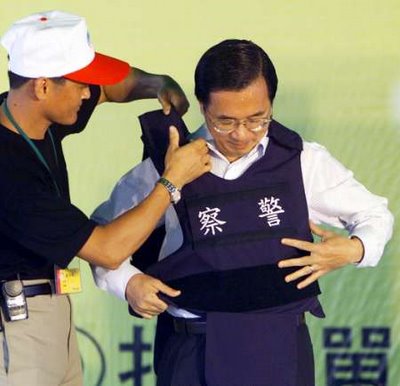 "President" Chen Shui-bian, donning a Kevlar vest
"President" Chen Shui-bian, donning a Kevlar vest
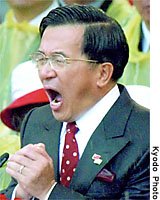 Taiwan's Caligula (1950 AD - 20?? AD)
Taiwan's Caligula (1950 AD - 20?? AD)
Comment: Let's not mince words.
Self-styled "Son of Taiwan" Chen Shui-bian and self-styled "Father of Taiwan" Lee Teng-hui are guilty of high treason, a capital crime which by itself would warrant their summary execution.
But even beyond that, the pair, both "father" and "son," are almost certainly guilty of premeditated murder.
Chen Shui-bian almost certainly ordered the murder of Pan Blue oriented Tainan resident Chen Yi-hsiung, the designated fall guy for Chen's 319 Wag the Dog "assassination attempt," staged by A-Bian's inner circle.
Lee Teng-hui almost certainly ordered the murder of ROC Navy Captain Ying Ching-feng, who was about to blow the whistle on the conspirators in the Lafayette Frigate procurement scandal.
Given the egregious crimes that Chen has committed against the nation as a whole, and individual citizens in particular, Chu Chao-kang would have been well justified, morally and ethically speaking, had he in fact thrust his bayonet straight into Chen Shui-bian's head.
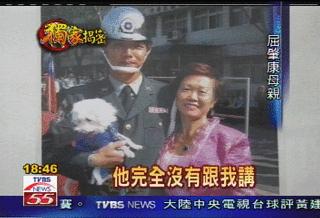 ROC Army Honor Guard Chu Chao-kang with his mother The elimination of a dictator is an act of righteousness. Whether Chu ought to have thrust his bayonet into Chen Shui-bian's head is not a moral issue, but a practical issue.
ROC Army Honor Guard Chu Chao-kang with his mother The elimination of a dictator is an act of righteousness. Whether Chu ought to have thrust his bayonet into Chen Shui-bian's head is not a moral issue, but a practical issue.
The question is not so much whether Chu or anyone else would have been justified in doing what he contemplated doing. The question is what would have been the most effective way to do it and get away with it.
As Plato observed: “Dictatorship naturally arises out of democracy."
On today's Taiwan, dictatorship has naturally arisen out of democracy.
As Victor Hugo observed: “When dictatorship is a fact, revolution becomes a right”
On today's Taiwan, dictatorship is a fact, therefore revolution is a right.
Some individuals may be wondering, "How could someone who was a member of the Honor Guard even think of doing something like that?"
These individuals are not thinking clearly. If these individuals were thinking clearly, they would realize it's precisely because Chu was a member of the Honor Guard, that he thought of doing something like that.
As someone who took the matter of honor seriously, Chu was quite reasonably and understandably outraged by Chen Shui-bian's dishonorable, not to mention treasonous behavior.
The fact that Chu has been arrested and faces a possible seven year sentence, merely for expressing his feelings on the Internet, is merely one more irony on top of all the cruel ironies that the long-suffering Chinese people on Taiwan have had to endure for the past 18 years.
Champions of Taiwan Independence don't believe in Democracy
Bevin Chu
July 05, 2006
As long time readers of The China Desk know, I am not a fan of democracy. Like America's Founding Fathers, I despise democracy.Modern day champions of democracy include Wilsonian "democratic universalists" such as William Kristol, exiled mainland Chinese student leaders such as Wang Dan, Hong Kong region pro democracy organizers such as Martin Lee, and Taiwan region pro democracy authors such as Long Ying-tai.
Most of these champions of democracy are blissfully unaware that America's Founding Fathers considered democracy the worst political system ever tried.
What kind of political system did America's Founding Fathers favor?America's Founding Fathers favored constitutional republicanism, and considered it the best political system ever devised.At one time, I too considered constitutional republicanism the best political system ever devised.Not anymore.Today I consider a long forgotten, unjustly neglected system known as "market anarchism," or "anarcho-capitalism," to be the best political system the human race has ever devised.
Today I consider constitutional republicanism the second best political system ever devised. To be perfectly frank, I consider it a very distant second.
See:
Market Anarchism, The Solution to the Dilemma of Taiwan Independence
But let's leave aside what kind of political system I believe in for the moment, and talk about what kind of political system champions of Taiwan independence believe in, or rather, say they believe in.Champions of Taiwan independence say they believe in democracy.
Champions of Taiwan independence say they believe in the hallowed right of the people to choose their political leaders, as well as determine public policy, by means of universal suffrage, majority rule, direct elections, referendum and recall.
Do they? Do champions of Taiwan independence really believe in democracy? Do champions of Taiwan independence really believe in the right of the people to hire and fire their public servants at their discretion?
Or do champions of Taiwan independence believe in democracy only when they are convinced the voters intend to vote their way?
Closer scrutiny reveals that champions of Taiwan independence believe in democracy only when it suits their purpose.
When champions of Taiwan independence realize that voters have no intention of voting their way, and democracy doesn't suit their purpose, they have no qualms whatsoever about overthrowing democracy and grinding the people's right to choose their own leaders into the dust. Anyone who doubts this charge need only examine the behavior of champions of Taiwan independence during the recent legislative recall vote.Consider the following June 28, 2006 China Post article entitled "Chen survives with 119-0 recall vote." China Post: President Chen Shui-bian survived yesterday an unprecedented recall vote as only 119 of the 221 legislators cast their ballots in favor of the recall motion, 29 ballots shy of the required two-thirds vote.Although fully aware of the difficulty of marshaling the needed 148 ballots needed to unseat Chen for his poor performance in the office and scams involving his family and aides, all of the 112 lawmakers of the opposition "pan-blue" alliance cast their ballots for the recall motion. They were aided by six members of the Non-Partisan Solidarity Union plus one independent legislator to lift the figure to a majority of 119, without even a single vote against the recall.Comment: So far, nothing unexpected. But read on, because here is where it gets interesting.China Post: The ruling Democratic Progressive Party (DPP) gave a strict order to bar its 86 lawmakers from taking part in the historic vote -- stripping them of the chance to express their views through a vote.The mass no-show of the DPP lawmakers was contrasted by their 12 partners in the Taiwan Solidarity Union (TSU) who showed up for the gathering but chose to cast "invalidated" ballots. A TSU legislator said they cast their ballots but elaborately rendered them invalid in order to prove that the TSU is different from the DPP, which wanted its lawmakers to keep Chen in office no matter what.Comment: In other words, "Democratic Progressive Party" legislators not only deprived Chinese citizens on Taiwan of the right to vote in a public referendum, the "Democratic Progressive Party" party hierarchy even deprived its own legislators of the opportunity to vote in the legislature.In other words, the 12 legislators of the Taiwan Solidarity Union (TSU) aided and abetted the DPP by rendering their own ballots null and void, ensuring that they would not count in favor of the recall motion. Having ensured that the Pan Blue initiated recall motion would fail, and that the voters would be denied the opportunity to rid themselves of a thoroughly corrupt champion of Taiwan independence (is there any other kind?), the TSU had the chutzpath to claim that its behavior, in contrast to the DPP's, was proof of the TSU's commitment to clean government!
China Post: The DPP hailed the vote outcome as a great victory, calling it a victory for all of the 23 million of people in Taiwan who want Chen to stay on until his current term expires in May 2008.Comment: A victory for all 23 million people on Taiwan, who purportedly want Chen Shui-bian to stay on until May 2008?Who's kidding whom?
As of June 26, on the eve of the legislative recall motion vote, Chen's public job approval rating stood at 16%, and his disapproval rating at 70%. The people on Taiwan want Chen out, period.In any "advanced democracy" any president or prime minister with numbers as pitiful as this would not be stonewalling and stalling for time. He or she would have resigned in shame, without waiting to be recalled or impeached.
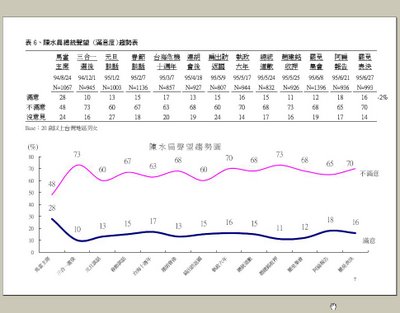 Chen Shui-bian's Approval Ratings: red indicates disapproval, blue indicates approval, Source: TVBS Cable News Network China Post: Although President Chen promised last week to put his fate in the hands of the 23 million people, the DPP's boycott of the recall vote effectively stripped the people of a public referendum on whether to oust Chen.Comment: Put "President" Chen's fate in the hands of the 23 million Chinese people on Taiwan is the one thing the DPP and the TSU absolutely refused to do.
Chen Shui-bian's Approval Ratings: red indicates disapproval, blue indicates approval, Source: TVBS Cable News Network China Post: Although President Chen promised last week to put his fate in the hands of the 23 million people, the DPP's boycott of the recall vote effectively stripped the people of a public referendum on whether to oust Chen.Comment: Put "President" Chen's fate in the hands of the 23 million Chinese people on Taiwan is the one thing the DPP and the TSU absolutely refused to do.
Consider the following June 28, 2006 China Post article entitled "Ma says DPP boycott of recall vote a victory for corruption."
China Post: Opposition leader Ma Ying-jeou yesterday condemned the ruling Democratic Progressive Party (DPP) for foiling a parliamentary motion aimed at ousting embattled President Chen Shui-bian, calling the move "a victory for corruption."Ma, head of the Kuomintang (KMT) party, charged that DPP lawmakers had chosen to "stand side by side with corruption" during the landmark recall motion, the first in Taiwan's history."The DPP used to be known among the public as a clean party but now they have lost their ideals" he told a press conference. The opposition failed to garner the necessary two-thirds vote when all 88 DPP members boycotted the session."What are they afraid of? ...This is a victory for corruption," Ma said.If the motion had passed it would have triggered a national referendum on whether to oust Chen before his second term ends in May 2008."President Chen dared not let people decide whether he should be ousted or continue serving the last two years of his second and final term." Comment: Ma Ying-jeou hit the nail squarely on the head. Champions of Taiwan independence dared not let the people on Taiwan decide whether Chen should be ousted or continue for two more years.
I hope readers got that, because that was the real issue during the recall battle in the legislature. That was the issue that champions of Taiwan independence desperately struggled to keep from public awareness.It is essential to understand that passage of the recall motion by the legislature would not have recalled Chen Shui-bian.
Passage of the recall motion by the legislature would merely have authorized a public referendum allowing the public to recall Chen.Legislators weren't voting on whether to recall Chen. That decision wasn't theirs to make. That decision belonged to the public. Pan Blue and independent legislators voted to allow the public to recall Chen, if that was the public's wish. Pan Blue and independent legislators respected the public's right to decide whether they wanted to put up with Chen for two more years.Pan Green legislators on the other hand, conspired to deny the public its right to recall Chen. Knowing that voters would have handed Chen his walking papers in a New York minute, Pan Green legislators, who never tire of boasting that they speak for "the People of Taiwan," denied the people on Taiwan the right to make that decision.Champions of Taiwan independence, by depriving the people on Taiwan of their right to fire a government employee who was not only not doing his job properly, but stealing from his employer to boot, made it abundantly clear that they don't believe in democracy.














